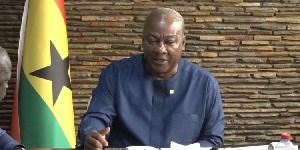
Ghana is prepared to renegotiate with the US government in order to potentially restore $190 million that was allocated to the energy industry under the Millennium Challenge Corporation (MCC).
This was revealed by President John Dramani Mahama when World Bank Vice President for West and Central Africa Mr. Ousmane Diagana paid him a courtesy call in Accra. Mr. Diagana was in Accra on January 7th to observe President Mahama's inauguration in Independence Square.
In order to pay off the debts and make the energy industry more efficient than it is now, Mr. Mahama reaffirmed that his administration needed to upgrade its systems.
He noted that while serving as Vice President under the late President Professor John Evans Atta Mills, he signed the MCC on the President's behalf. The goal of the agreement was to make Ghana the most efficient electricity producer in Africa and a major export hub.
Democracy, regrettably, has advantages, but it can also occasionally be a liability.After we departed the government, the Millennium Challenge Compact was taken up by a new administration.
The final part of it, which was delivering efficiency in metering, billing, distribution, and everything else, came next," he said. Naturally, PDS is now a thing of the past.However, we want to take another look at it because our entire power value chain would continue to have serious issues if we don't address the Electricity Company of Ghana.
Therefore, we wish to resume our efforts to privatize the final point of electricity distribution in order to introduce efficiency from the private sector.
"I met with the Millennium Challenge Corporation and spoke with the Americans. We requested that they restore the $190 million they had allocated to that part of it.The President responded, "And they said the door is not closed."
Therefore, we must continue that conversation.Alternatively, we can lessen the losses related to the independent power producers (IPPs) if the World Bank can help us complete that portion of it even if we do not have access to the $190 million.
He stated that in order to stabilize the situation until they could implement all of the reforms in that sector, they would restore the cash waterfall mechanism and some transparency to the system in the interim.
The World Bank's dedication to assisting Ghana's socioeconomic development program was emphasized by Mr. Ousmane Diagana, the Bank's vice president for West and Central Africa.